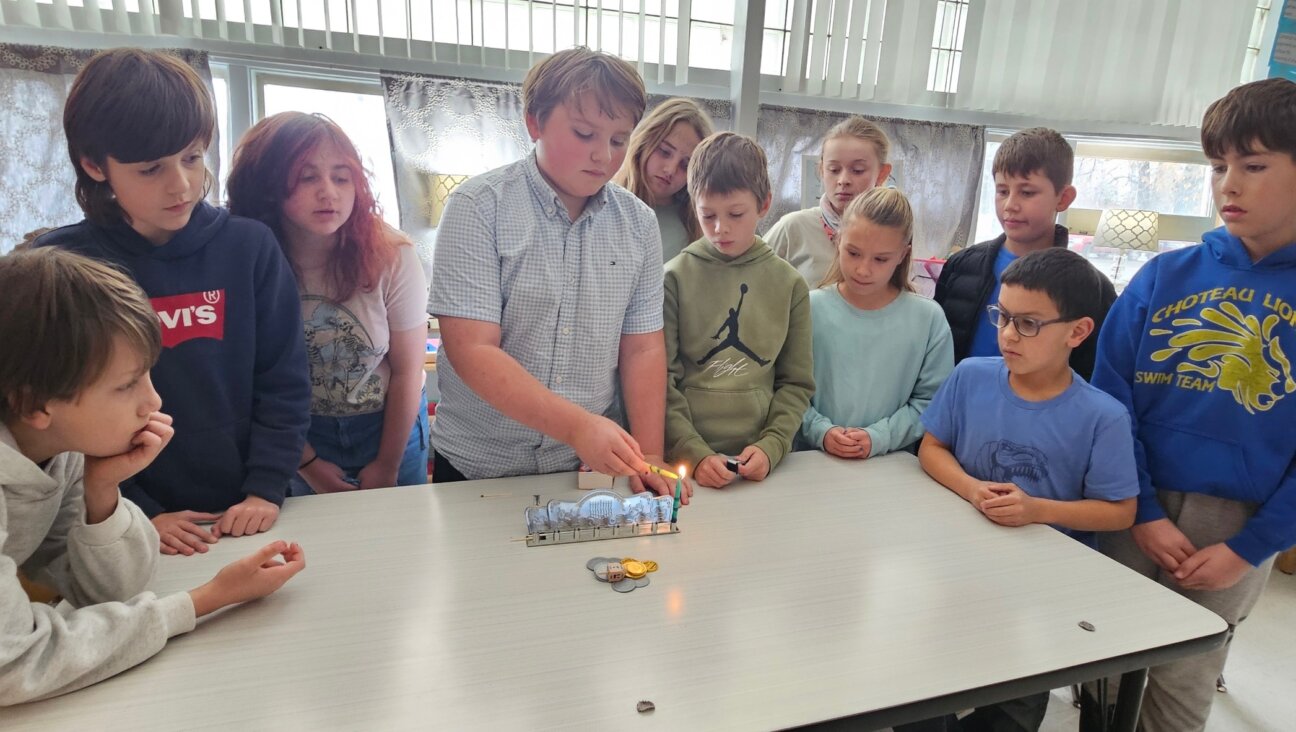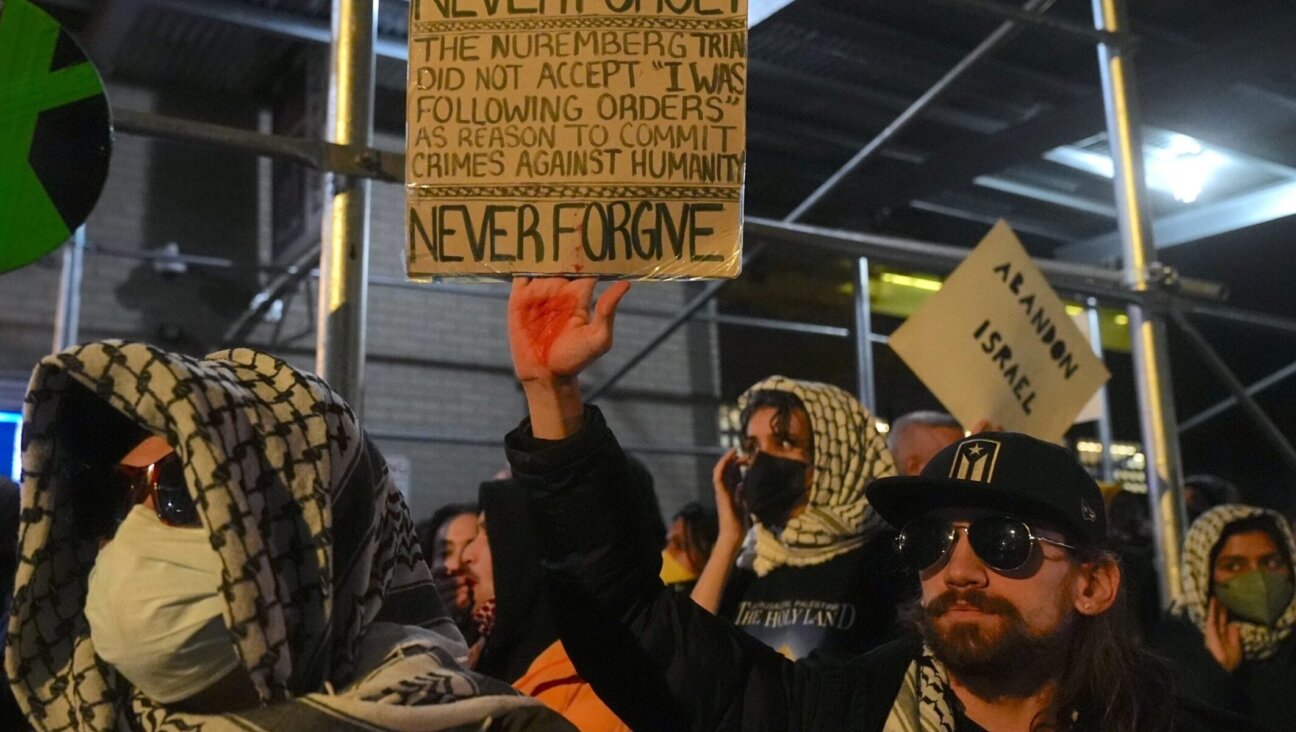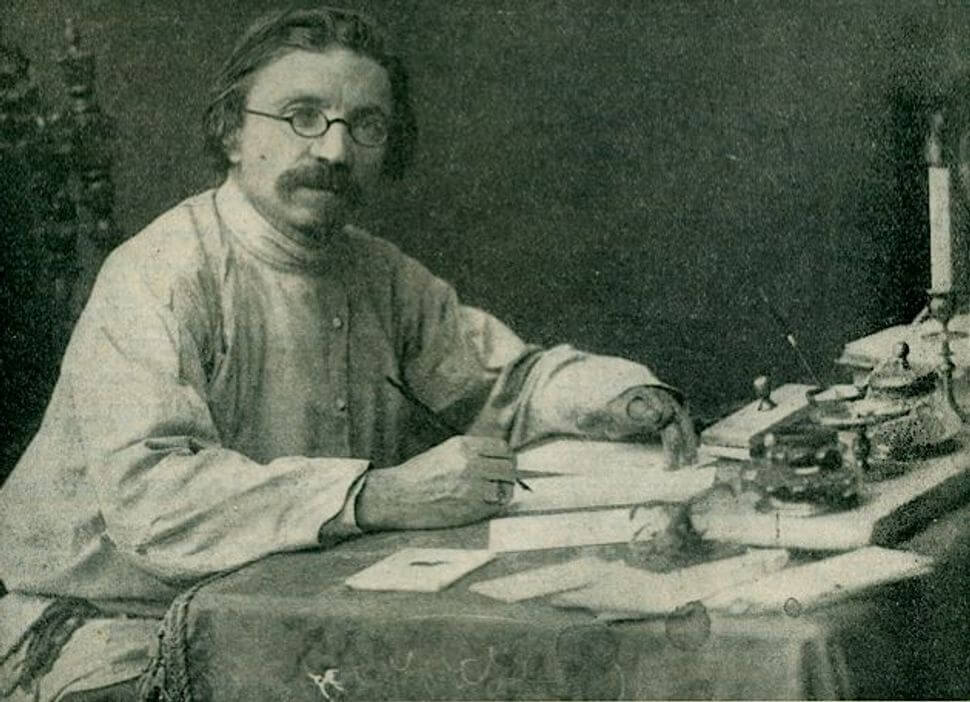Orthodox Jews are donating plasma by the thousands to fight COVID-19

Graphic by Angelie Zaslavsky
Read this article in Yiddish
Well before the rest of the world was talking about blood plasma and its use in fighting coronavirus, Dr. Shmuel Shoham knew all about it — and where he could probably get a lot of it.
By early March, Shoham, an expert on infectious diseases in transplant patients at Johns Hopkins University, had already realized that convalescent plasma — antibodies spun out of the blood of people who had Covid-19 — could be a key therapy in fighting the disease.
So he called a friend who is an Orthodox Jew — Chaim Lebovits, a shoe wholesaler from Monsey, N.Y. — to ask him if he could encourage others in his community to donate their plasma. Orthodox Jews, Shoham reasoned, hit early and hard by the virus, probably had an abundance of people with just the right antibodies — people who got sick and recovered, or people who had the virus and never even knew it.
“I had no idea that he would drop everything and completely immerse himself in this,” Shoham said. Lebovits “is giving his community members a chance to do something, now that they have this power in their body to make a difference.”
I can confirm that they’re lining up in Flatbush to donate/get tested to donate! (Sent from the line outside Chaim Berlin High School.) https://t.co/GUsp9A2X1S pic.twitter.com/nLZhx0cxeO
— Johnny Kunza (@johnkunza) April 22, 2020
What began as a one-man volunteer effort to connect post-Covid Jews with New York-area hospitals has now become a broad coalition, including major hospitals, Orthodox groups and a range of Orthodox Jews from visibly religious Hasidic communities to the so-called Modern Orthodox who participate more fully in secular life. It’s made Orthodox Jews a major force in donating plasma, which doctors hope to have a major benefit in the fight against the coronavirus.
The effort has also given Orthodox Jews — of whom there are about 700,000 in the New York area — a chance to recast the narrative of coronavirus around their community. Though every major institution of Orthodox life has shut down, there have been holdouts in the Hasidic community, such as schools and ritual baths that remain open, or funerals that have drawn hundreds of mourners. These outliers, as Orthodox Jews call them, have led to negative media attention and claims on social media that Orthodox Jews are spreading the virus and ignoring social distancing rules more than other groups.
Yonoson Rosenblum, in the Orthodox monthly Mishpacha, wrote in an article published Tuesday that the plasma donation effort stood to create a world in which “all the negative news coverage of chareidi” — or ultra-religious — “Jews was suddenly replaced by images of chareidi Covid-19 survivors lining up in multitudes to give potentially life-saving convalescent blood plasma to those still battling the virus.”
Lebovits does not have medical training, but for years has acted as an informal advisor to friends and fellow Hasidic Jews who want help connecting to and speaking with medical professionals about their treatment. That’s how Lebovits met Shoham, as well as Dr. Jeffrey Bander, a Mount Sinai cardiologist who helped Lebovits begin directing Orthodox donors to the hospital’s plasma donation program.
Lebovits began working on getting Jews to donate plasma at the beginning of March. But when his wholesale operation had to close, since it is a nonessential business, he threw himself into creating a network of rabbis, religious organizations, virus researchers, health professionals and hospital administrators to educate the Orthodox about the benefits of plasma donation, test them, take their blood to spin out the antibody-rich plasma and pass it onto hospitals.
So far, Lebovits said, more than 3,000 people — mostly men — have donated plasma at blood banks around the region, and 6,000 more were being tested on Wednesday to see if they have the right antibodies. Lebovits said that he hopes to organize more than 45,000 people from the Orthodox community around New York City to donate plasma. Dr. David Reich, president and chief operating officer of the Mount Sinai hospital system, said that more than half of the donors to their plasma collection efforts have been Orthodox.
“The plasma isn’t just used for frum” — religious — “people or Jewish people, it’s for people in general,” Lebovits said. “We as observant Jews have an obligation to preserve life, and save life, and help as many people as we can.”
The effort has the literal and figurative blessings of the Orthodox establishment. Two respected decisors of Jewish law — Rabbi Yisroel Reisman and Rabbi Reuven Feinstein — have said that Jews are encouraged to donate plasma — and can even drive on Shabbat and holidays in order to do so. The Orthodox Union and Agudath Israel of America, the two largest Orthodox umbrella organizations, are sending messages to the community about the science of plasma and its use in treating Covid-19.
Wealthy Orthodox philanthropists are also involved, according to Serle, in some cases buying machines for blood centers so they can take more donations. He declined to name any of the philanthropists.
Lebovits and his fellow volunteers have been working with health centers in Orthodox hubs to do the testing, to see if people have a sufficient number of antibodies to donate plasma, and then arranging appointments with and transportation to the blood banks that can receive the plasma.
Lebovits said he has sent tests from Orthodox hubs to Mount Sinai and Montefiore network hospitals in New York, as well as to small urgent cares that can send the tests to large labs and to Minnesota’s Mayo Clinic.
Once people are approved to donate, there is the task of finding space at blood donation centers, many of which are at capacity. Mordy Serle, a lawyer from the Flatbush neighborhood of Brooklyn who is helping with the effort, said that New York Blood Center, a nonprofit that supplies blood to hundreds of New York hospitals, tells them at 5 p.m. how many slots they have open for the next day, and Serle finds donors to fill the slots.
The first community to get involved was Young Israel of New Rochelle, the synagogue that was one of the country’s early hotspots. Lebovits said that 40 Young Israel congregants donated plasma about three weeks ago.
The latest efforts have seen more than 120 Hasidic Jews from Monsey and New Square, perhaps the most insular Hasidic village in Rockland County, N.Y., take an entire day to travel to Delaware to get hooked up at the nearest blood bank that had the capacity to take them. Nuchem Lebovits, Chaim Lebovits’ 18-year-old son, was among the donors earlier this week; his father posted a picture of him on Twitter.
#ConvalescentPlasma after filling all the available slots of the local blood banks, members of the Orthodox Jewish community in Rockland Co. NY, traveled Delaware to donate plasma to save lives. Proud that our community is at the forefront of this initiative @MountSinaiNYC pic.twitter.com/zGVHRYYOmr
— Chaim M Lebovits (@LebovitsM) April 22, 2020
“Every single open spot within a day’s travel, we’re putting a Jew in,” said Serle
On Sunday, the Mayo Clinic received 1,000 blood samples to test for antibodies from donors in Lakewood, N.J., a major Orthodox hub, to be tested for antibodies, according to Dr. Mike Joyner, who leads the convalescent plasma program at Mayo. The testing was conducted by Lev Rochel Bikur Cholim, a medical assistance provider in Lakewood. Refuah Health Center, a community health provider network based near Monsey, has processed more than 2,000 tests, Lebovits said.
Joyner said he expects to process thousands more tests from Orthodox Jews, and that the community’s contribution to making New York a center of plasma donation could help people across the country recover from the disease faster. He said he wants New York City to become the “Saudi Arabia” of supplying plasma.
New Yorkers stepping up to get evaluated as potential plasma donors. pic.twitter.com/4FUvnt5dNh
— Shmuel Shoham (@ShohamTxID) April 5, 2020
Now that cases of the virus are starting to spread rapidly outside New York, Lebovits is trying to rally Orthodox communities around the country. He has already contacted people in Minnesota, Baltimore, Detroit, Montreal and other places to spread the world about the importance of plasma donation.
Lebovits, Serle and others have worked not only through Shabbat and the recent Passover holiday, but also through the kinds of life events that, in a normal world, would merit at least a moment’s pause. Serle said that two weeks ago he got on a conference call with Dr. Joyner, of the Mayo Clinic, 15 minutes after the birth of his daughter — at the urging of his wife.
Last week, on the last day of Passover, Lebovits’ brother Yitzchak died of cancer at 47. Since then, Lebovits has been working through the shivah mourning period.
“He personally asked, when I was with him the last time, that regardless of what happens to him, I should make sure to not stop this effort,” Lebovits said. The project has now been named for Lebovits’ brother.
When this is all over, Lebovits said, he’ll stop and grieve. But not yet.
“I don’t think I have the right to be selfish, when other peoples’ lives are at stake,” he said.
To learn more about donating convalescent plasma, click here.
Ari Feldman is a staff writer at the Forward. Contact him at [email protected] or follow him on Twitter @aefeldman
















